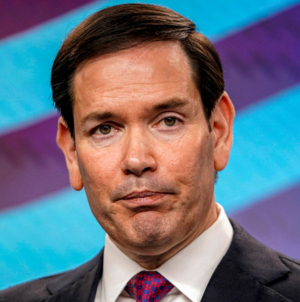-
Saudi Arabia vs. Norway: How to Watch, Odds, U-20 Preview - 4 mins ago
-
Marco Rubio says ongoing Gaza peace talks are ‘not yet’ the end of the war - 14 mins ago
-
Cowboys Vet Sends His Brother a Message Before Battle vs Jets - 17 mins ago
-
Nigeria vs. Colombia: How to Watch, Odds, U-20 Preview - 48 mins ago
-
How to Watch Newcastle United vs Nottingham Forest: Live Stream Premier League, TV Channel - 56 mins ago
-
English far-right leader Tommy Robinson invited to Israel - about 1 hour ago
-
NFL International Series: How to Bet on the Vikings vs Browns NFL London Game - 2 hours ago
-
Eric Dane vows to ‘fight to the last breath’ against ALS in visit to Washington - 2 hours ago
-
Donald Trump Pleads for ‘Google/YouTube’ Change Before Midterms - 2 hours ago
-
Pope Leo, after Trump critique, urges Catholics to help immigrants - 2 hours ago
Will Nigeria Overturn its Draconian Blasphemy Laws? | Opinion
“This man will be executed.”
That was the threat a Nigerian government lawyer made against a young man outside of the Supreme Court of Nigeria last week. The young man’s crime? Sharing song lyrics over WhatsApp that others deemed blasphemous against the Prophet Muhammad. The government of Kano State, Nigeria, wants to kill the young man for that.
It is no secret that Christians and religious minorities in Nigeria face some of the most rampant and violent persecution in the world. While their suffering is often overlooked or even forgotten in the West, waves of religiously motivated violence against Christians broadly and Muslims who reject extremism, including mob violence from blasphemy accusations, have become so widespread that even public figures like Bill Maher are now speaking out about Nigeria.
Nigeria is one of only seven countries where a person can be sentenced to death for alleged blasphemy. In 12 of the country’s northern states, Sharia criminal laws introduced 25 years ago make it a capital crime to “insult” the Quran or “any of its prophets.” Blasphemy accusations have been used repeatedly to persecute Christians and other religious minorities in the country.
The man fighting for his life in this case is a young Sufi Muslim musician named Yahaya Sharif-Aminu.
Over five years ago, at the end of February 2020 in Kano State, Nigeria, Yahaya shared song lyrics he had composed related to his faith on a private WhatsApp group. Sufis are a minority Muslim group within Kano, which is largely Sunni Muslim. Some others within the group interpreted Yahaya’s lyrics as an insult to the Prophet Muhammad. They formed a mob calling for his arrest and burned down his childhood home.
Soon after, Yahaya was arrested and charged with blasphemy under Kano State’s Sharia Penal Code Section 382(b), which mandates the death penalty for those convicted of blasphemy. He was tried, convicted, and sentenced to death within six months, even though he had no legal representation.
While Yahaya’s conviction was eventually overturned, he was ordered to a retrial, where he would face the same death-penalty blasphemy law. Yahaya’s appeal from the retrial order has been pending at the Supreme Court since the end of 2022. He has spent over five and a half years in prison because he peacefully shared song lyrics expressing aspects of his faith. His appeal is now moving, and his case will be heard on the merits in the coming months. He is finally getting his day in court.
Unlike every other country that has a death-penalty blasphemy law, Nigeria’s constitution states that no federal or state government may establish an official religion. Nigeria’s constitution also protects religious freedom and freedom of expression in language drawn from major internationally recognized human rights treaties. Despite these constitutional protections, Kano State has defended its law on expressly religious grounds, stating recently that it is designed to protect the “sanctity” of Islam and “preserve the faithful values of its predominantly Muslim population.”
After last week’s hearing, the lawyer for Kano State immediately vowed that the government would publicly “execute” Yahaya if it won. It is astonishing that a country with a non-sectarian constitution has laws mandating death for individuals who peacefully express religious views that offend the majority. Religious freedom means little if an individual from a minority religious group might be killed, and his killing sanctioned by the state, for expressing his religious and artistic viewpoint.
These sorts of laws have also led to a spate of horrifying examples of mob violence based on blasphemy accusations, targeting Muslims, Christians, and others, even as recently as a month ago. And these laws operate against a backdrop of widespread religiously motivated violence against peaceful Christians and Muslims.
The Nigerian Supreme Court finally has a chance to rectify this injustice. It can set a world-changing example by making clear that draconian blasphemy laws have no place in a modern constitution grounded on fundamental human rights.
The world has taken notice of Yahaya’s case. The European Parliament has twice called for Yahaya’s release, asking Nigeria to set an example by abolishing the blasphemy laws under which he has been detained for over five years. The West African treaty court, the ECOWAS Court, earlier this year called for the repeal of Nigeria’s blasphemy laws.
U.S. officials have similarly focused on problems of religious freedom in Nigeria. Senator Ted Cruz (R-Tex.) recently introduced legislation calling for sanctions on Nigeria because of its severe religious freedom violations, including blasphemy laws, and he and four other senators sent a letter last month to the State Department urging Secretary Marco Rubio to designate Nigeria as a Country of Particular Concern. Congress could add further pressure by quickly confirming President Donald Trump’s nominee for the international religious freedom ambassador, Mark Walker, so that he can directly advocate against these blasphemy laws.
Now is a pivotal moment in the global fight against blasphemy laws, and in favor of religious freedom and free speech. The Nigerian Supreme Court now has the chance to do what is clearly right and just. It should overturn Nigeria’s death penalty blasphemy law and free Yahaya Sharif-Aminu.
Sean Nelson is an international human rights lawyer serving as Senior Counsel for Global Religious Freedom with ADF International. ADF International is supporting Yahaya Sharif-Aminu’s appeal at the Supreme Court of Nigeria.
The views expressed in this article are the writer’s own.
Source link




























